
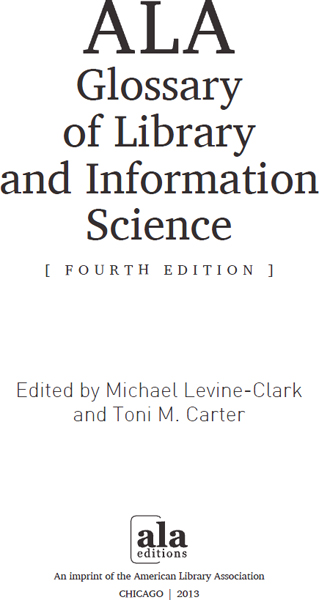 MICHAEL LEVINE-CLARK is the associate dean for scholarly communication and collections services at the University of Denver Libraries. He holds an MS in library and information science from the University of Illinois and an MA in history from the University of Iowa. With colleagues from the Colorado Alliance of Research Libraries, he founded the open access journal Collaborative Librarianship, for which he currently serves as coeditor for scholarly articles. He writes and speaks regularly on strategies for improving academic library collection development practices, including the use of e-books in academic libraries and the development of demand-driven acquisition models. TONI M. CARTER is an instruction and reference librarian at Auburn University in Alabama.
MICHAEL LEVINE-CLARK is the associate dean for scholarly communication and collections services at the University of Denver Libraries. He holds an MS in library and information science from the University of Illinois and an MA in history from the University of Iowa. With colleagues from the Colorado Alliance of Research Libraries, he founded the open access journal Collaborative Librarianship, for which he currently serves as coeditor for scholarly articles. He writes and speaks regularly on strategies for improving academic library collection development practices, including the use of e-books in academic libraries and the development of demand-driven acquisition models. TONI M. CARTER is an instruction and reference librarian at Auburn University in Alabama.
She holds an MS in library and information studies and an MA in history, both from the University of Alabama. She was selected a 2010 ALA Emerging Leader and recently completed a two-year term as chair of the ALA Scholarship and Study Grants Committee.
2013 by the American Library Association. Any claim of copyright is subject to applicable limitations and exceptions, such as rights of fair use and library copying pursuant to Sections 107 and 108 of the US Copyright Act. No copyright is claimed for content in the public domain, such as works of the US government. Extensive effort has gone into ensuring the reliability of the information in this book; however, the publisher makes no warranty, express or implied, with respect to the material contained herein.
ISBNs: 978-0-8389-1111-2 (paper); 978-0-8389-9655-3 (PDF); 978-0-8389-9657-7 (ePub); 978-0-8389-9658-4 (Kindle). For more information on digital formats, visit the ALA Store at alastore.ala.org and select eEditions. Library of Congress Cataloging-in-Publication Data ALA glossary of library and information science. 4th edition / edited by Michael Levine-Clark and Toni M. Carter. pages cm Includes .
ISBN 978-0-8389-1111-2 (pbk. : alk. paper) 1. Library scienceDictionaries. 2. I. I.
Levine-Clark, Michael. II. Carter, Toni M. Z1006.A48 2012 020.3dc23 2012010060 Cover design by Karen Sheets de Gracia. [ contents ] As with previous editions of this work, the fourth edition of the ALA Glossary of Library and Information Science brings together into one source the terminology relating to the wide range of functions performed by libraries and related organizations. We have attempted to avoid termssuch as budget or computerthat, while important to the profession, are not specific to it.
There is a fine line between discipline-specific terms and general terms that are used by librarians and information professionals; we have surely crossed back and forth over that line. When the third edition of the was published in 1983, the editors thought it worthwhile to include a number of terms related to computers and computer science, terms such as computer and electronic mail that are now so embedded in our lives that they do not need definitions. We have removed most similar terms as well as a number of obsolete computer terms such as diskette. A huge portion of the last edition of the was dedicated to terminology related to microform technology and reprographics. While still relevant to our profession, neither serves a central function anymore. We have deleted most of these terms; readers needing to study these topics in depth may wish to consult the third edition.
We have also deleted most of the general administration and management termsterms such as internship and performance appraisalthat most readers should be familiar with regardless of disciplinary affiliation. In cases where there is an aspect of administration or management particular to library and information science, we have included definitions. In all, we deleted more than 2,000 terms. In the three decades since the publication of the third edition of the , a lot has changed in our profession. We no longer need definitions for basic computer terms, but computers and the Internet have transformed our profession, necessitating wholesale revisions of entire categories of terminology. We have made major revisions to more than 600 definitions (and minor revisions to hundreds more), in some cases replacing the term with something more currentfor instance, replacing and in many others updating the definition to include references to electronic resources and workflow.
We have also added a large number of entries, including terms related to metadata (. Throughout the , we have not indicated a definition number in the cross-references. The process of revising this was a team effort. Jennifer A. Bartlett, Robert Cagna, Sandra Macke, Carol A. Reichardt, and Kay Vyhnanek, who are also listed below, served as contributing editors, managing groups of writers with expertise in particular subject areas. They were assisted by Danielle M.
Colbert-Lewis (North Carolina Central University), Marian Hampton (University of Pittsburgh), Robin L. Kear (University of Pittsburgh), Jean Liddell (Auburn University), Sara Rofofsky Marcus (Queensborough Community College), Karen Tatarka (Auburn University), Elizabeth J. Weisbrod (Auburn University), Pambanisha Whaley (Auburn University), and Neal Wyatt (Virginia Commonwealth University). All these contributors did a tremendous amount of work, looking up new terms and old on the web and in various reference sources. We owe them a huge debt of gratitude, as this project could not have been completed without them. At the University of Denver, Christopher Alexander and Lisa Diedrich supervised the following students who had various tedious tasksmostly involving a lot of copying, pasting, and reformattingthat made our jobs much easier: Benjamin Applebee, Akira Armbrust, Robert Eckart, Alison Farnham, Chrissy Klenke, Jenny Rodgers, Brett Schneider, Sara Shanahan, Galen Smith, Keely Smith, John Spracklen, Dan Steelman, Becca Stephens, Chrissy Taylor, and Austin Yockey.
Michael Levine-Clark would like to thank his wife, Marjorie, and his daughter, Isabel, for putting up with him while he worked through winter break on this glossary. Toni M. Carter would like to thank her parents, Tony and Mitzi Carter, and her colleagues at Auburn for their support throughout this project. Contributing Editors JENNIFER A. BARTLETT, Head of Reference Services, University of Kentucky Libraries ROBERT CAGNA, Library Director, West Virginia Health Sciences Center, Charleston Division SANDRA MACKE, Catalog Librarian, University of Denver Libraries CAROL A. REICHARDT, Reference, Instruction, and Outreach Librarian, J.
Eugene Smith Library, Eastern Connecticut State University KAY VYHNANEK, Associate Professor and Scholarly Communication Librarian, Washington State University AACR2 See . AAHSL See . AALL See . A&I See . A&I service See . AAP See . AASL See . AAUP See . ABA See . ABAA See . abbreviated cataloging See . abridged edition See . abridgment A shortened . absence circulation system A . absolute language See . absolute location See . abstract An abbreviated, accurate representation of a . abstract bulletin A (1). abstracting and indexing See . abstracting and indexing service A (5). abstract journal A . ACA See . academic freedom The right to teach, learn, and study without interference. academic freedom The right to teach, learn, and study without interference.
Compare with . academic librarianship . academic library A of students, faculty, and affiliated staff of the institution. academic status An official recognition by an institution of postsecondary education that . Academy of Certified Archivists (ACA) An accrediting agency dedicated to certifying (2). academy publication A .
Next page
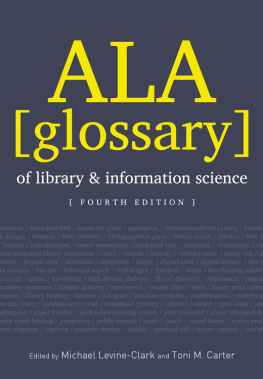

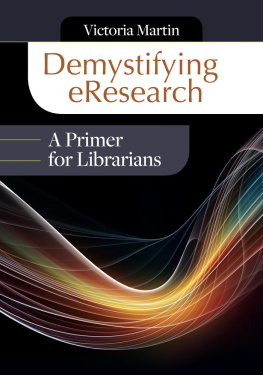
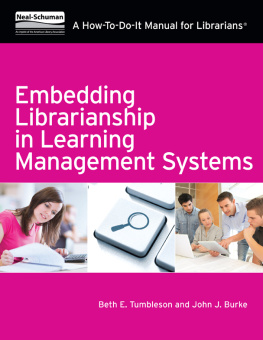
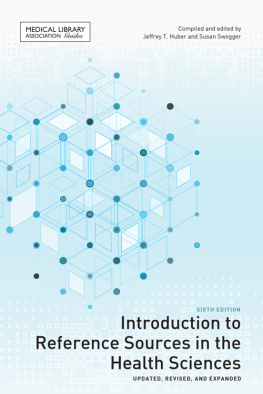
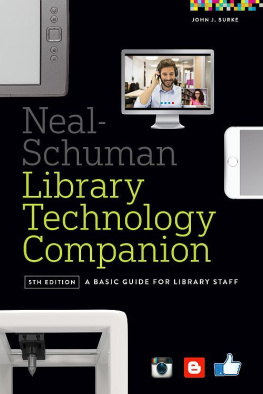
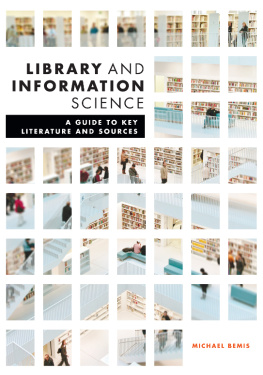
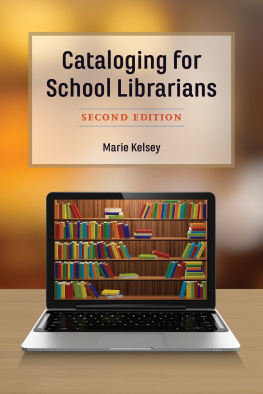
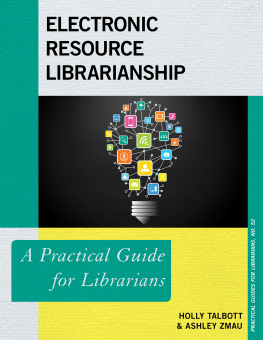
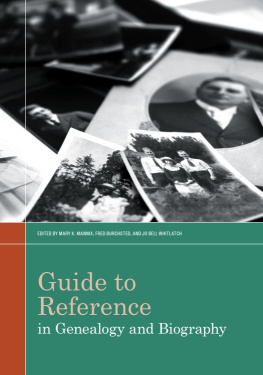

 MICHAEL LEVINE-CLARK is the associate dean for scholarly communication and collections services at the University of Denver Libraries. He holds an MS in library and information science from the University of Illinois and an MA in history from the University of Iowa. With colleagues from the Colorado Alliance of Research Libraries, he founded the open access journal Collaborative Librarianship, for which he currently serves as coeditor for scholarly articles. He writes and speaks regularly on strategies for improving academic library collection development practices, including the use of e-books in academic libraries and the development of demand-driven acquisition models. TONI M. CARTER is an instruction and reference librarian at Auburn University in Alabama.
MICHAEL LEVINE-CLARK is the associate dean for scholarly communication and collections services at the University of Denver Libraries. He holds an MS in library and information science from the University of Illinois and an MA in history from the University of Iowa. With colleagues from the Colorado Alliance of Research Libraries, he founded the open access journal Collaborative Librarianship, for which he currently serves as coeditor for scholarly articles. He writes and speaks regularly on strategies for improving academic library collection development practices, including the use of e-books in academic libraries and the development of demand-driven acquisition models. TONI M. CARTER is an instruction and reference librarian at Auburn University in Alabama.